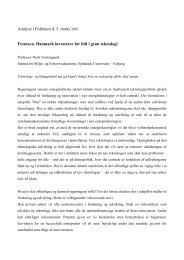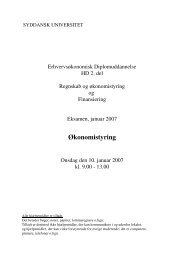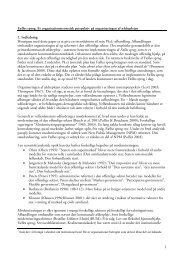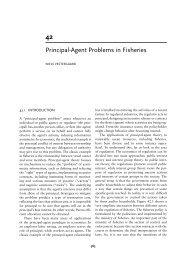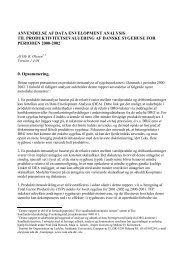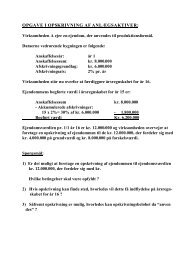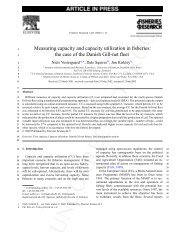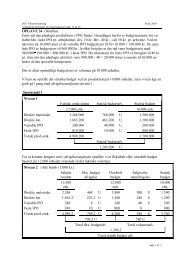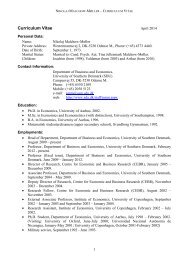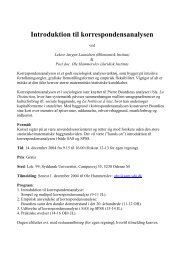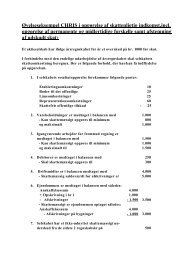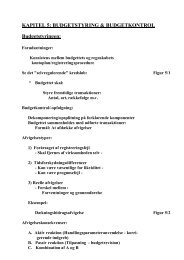Development of Parties and Party Systems in ... - lah@sam.sdu.dk
Development of Parties and Party Systems in ... - lah@sam.sdu.dk
Development of Parties and Party Systems in ... - lah@sam.sdu.dk
- No tags were found...
Create successful ePaper yourself
Turn your PDF publications into a flip-book with our unique Google optimized e-Paper software.
2001 parliamentary election, however, without underm<strong>in</strong><strong>in</strong>g SLD-UP’s then strong electoralposition.At the September 2001 election AWSP lost parliamentary representation, obta<strong>in</strong><strong>in</strong>g only 5.5 pct. <strong>of</strong>the votes, less than dem<strong>and</strong>ed for party alliances to be represented <strong>in</strong> the parliament. The Polishright became represented by nationalist The League <strong>of</strong> Families (LPR) <strong>and</strong> Kaczynskis “Law <strong>and</strong>Justice <strong>Party</strong>” ( PiS). The liberal side <strong>of</strong> the political spectrum was represented by the CitizenPlatform (OP), <strong>in</strong> the beg<strong>in</strong>n<strong>in</strong>g <strong>of</strong> 2001 it was jo<strong>in</strong>ed by the SKL, until then a AWS faction. Boththe Freedom Union (UW) <strong>and</strong> the AWS (Solidarnosc), two found<strong>in</strong>g parties with a background <strong>in</strong>the Solidarity movement <strong>and</strong> occupy<strong>in</strong>g several governmental posts <strong>in</strong> the years s<strong>in</strong>ce 1989, did notpass the treshold requirements.The question has been raised, why the party alliance AWS failed while the left w<strong>in</strong>g SLDsucceeded. As argued by Michael D. Kennedy (Kennedy, 1991:180), it may be useful to dist<strong>in</strong>guishbetween different types <strong>of</strong> party alliances, some have been based on economic <strong>in</strong>teraction, i.e. oncommon socio-economic <strong>in</strong>terests <strong>and</strong> networks, others based on self-identification, i.e. held up byreference to a common enemy (“We” versus “Them”), i.e. the (post)communists. Focus on thecommon “enemy” <strong>in</strong>evitably re<strong>in</strong>force moral policy positions with a narrow space for politicalnegotiations as negotiations signify moral compromise. Inside the “identity” type <strong>of</strong> alliancesprogrammatic, policy <strong>and</strong> <strong>in</strong>stitutional questions <strong>and</strong> the economic goal function are neglected.Most voters seem prefer programme <strong>and</strong> well <strong>in</strong>stitutionalised or- alternatively- extreme populistparties, however, until the 2001 election that type <strong>of</strong> parties could not be found on the Polish Right.Furthermore, many problems have been policy-related bound to the low quality <strong>of</strong> publicgovernance. As noted by Lena Kolarska-Bob<strong>in</strong>ska 58 , a precondition for a political success is that thepolicy content is communicated to the people properly. Time had passed when parliamentaryelections can be won only by us<strong>in</strong>g vague <strong>and</strong> broad political appeals based on abstract <strong>and</strong>symbolic politics. More important than a cab<strong>in</strong>et reshuffles <strong>and</strong> <strong>in</strong>stitutional <strong>in</strong>fight<strong>in</strong>gs is toimprove the whole philosophy <strong>of</strong> public governance <strong>and</strong> the mode <strong>of</strong> decision-mak<strong>in</strong>g (”filoz<strong>of</strong>iarzadzenia”) <strong>and</strong> policy implementation. Unfortunately, from the outset the party alliance AWS (<strong>and</strong>RS AWS) used too much energy to <strong>in</strong>itiate destructive wars aga<strong>in</strong>st itself (”walka AWS z AWS”).Summariz<strong>in</strong>g, we can say that AWS’ problems can be found on different levels <strong>of</strong> analysis, onhistorical level <strong>in</strong> the shape <strong>of</strong> a reactivation <strong>of</strong> old “We-Them” contradictions <strong>in</strong> society with thebuilt-<strong>in</strong> tendency towards "over-ideologisation" <strong>and</strong> symbolic politics, on <strong>in</strong>stitutional level <strong>in</strong> theshape <strong>of</strong> <strong>in</strong>efficient party organisation <strong>and</strong> bad <strong>in</strong>stitutionalisation, on actor-behavioural level <strong>in</strong> theshape <strong>of</strong> too many “wars <strong>in</strong> the top” characterised by extremely low party loyalty <strong>and</strong> cohesion, <strong>and</strong>f<strong>in</strong>ally on policy-level <strong>in</strong> the shape <strong>of</strong> several disagreements as regards the concrete “day to day”policy.2.11. AWS’ other ”legs”In this conclud<strong>in</strong>g section AWS’ other ”legs” will be exam<strong>in</strong>ed <strong>in</strong> more details. As noted above, thefaction SKL has represented the conservative-liberal l<strong>in</strong>e. SKL was founded December 1997, <strong>and</strong>20 persons from SKL were elected to parliament at the 1997 election. SKL was badly organized atleast compared with the Christian-National factions <strong>in</strong>side AWS. Prom<strong>in</strong>ent politicians from SKL,e.g. Jan Maria Rokita <strong>and</strong> Aleks<strong>and</strong>er Hall, had been former members <strong>of</strong> Democratic Union (UD),58 Lena Kolarska-Bob<strong>in</strong>ska, ”Kapitalizm nie taki, jaki mial byc”, Gazeta Wyborcza 6.-7. 11. 1999:2-3.66



